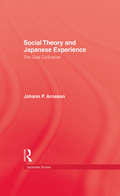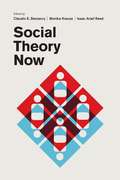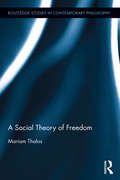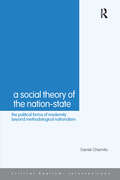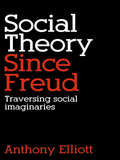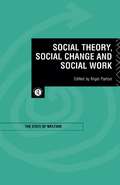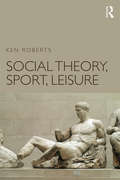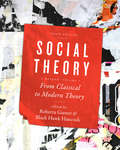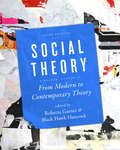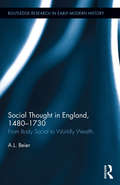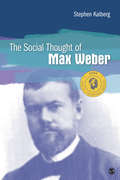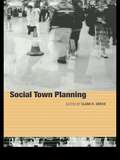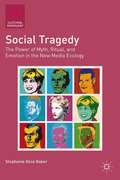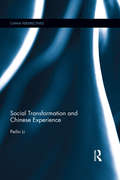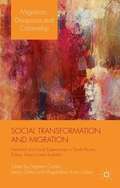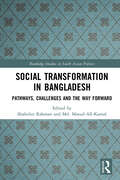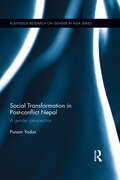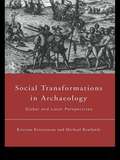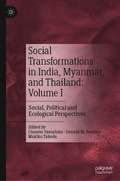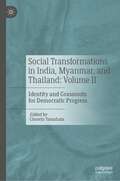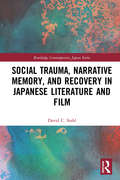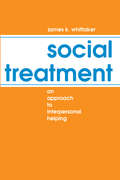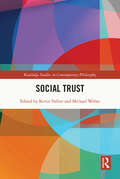- Table View
- List View
Social Theory & Japanese Experie: The Dual Civilization
by ArnasonFirst published in 1997. Routledge is an imprint of Taylor & Francis, an informa company.
Social Theory Now
by Claudio E. Benzecry, Isaac Ariail Reed, and Monika Krause Isaac Ariail Reed Monika KrauseThe landscape of social theory has changed significantly over the three decades since the publication of Anthony Giddens and Jonathan Turner’s seminal Social Theory Today. Sociologists in the twenty-first century desperately need a new agenda centered around central questions of social theory. In Social Theory Now, Claudio E. Benzecry, Monika Krause, and Isaac Ariail Reed set a new course for sociologists, bringing together contributions from the most distinctive?sociological?traditions?in an ambitious survey of where social theory is today and where it might be going. The book?provides a strategic window onto social theory based on current research, examining trends in classical traditions and the cutting edge of more recent approaches. From distinctive theoretical positions, contributors address questions about?how social order is accomplished; the role of materiality, practice, and meaning; as well as the conditions for the knowledge of the social world. The theoretical traditions presented include cultural sociology, microsociologies, world-system theory and post-colonial theory, gender and feminism, actor network and network theory, systems theory, field theory, rational choice, poststructuralism, pragmatism, and the sociology of conventions. Each chapter introduces a tradition and presents an agenda for further theoretical development. Social Theory Now is an essential tool for sociologists. It will be central to the discussion and teaching of contemporary social theory?for years to come.
A Social Theory of Freedom (Routledge Studies in Contemporary Philosophy)
by Mariam ThalosIn A Social Theory of Freedom, Mariam Thalos argues that the theory of human freedom should be a broadly social and political theory, rather than a theory that places itself in opposition to the issue of determinism. Thalos rejects the premise that a theory of freedom is fundamentally a theory of the metaphysics of constraint and, instead, lays out a political conception of freedom that is closely aligned with questions of social identity, self-development in contexts of intimate relationships, and social solidarity. Thalos argues that whether a person is free (in any context) depends upon a certain relationship of fit between that agent’s conception of themselves (both present and future), on the one hand, and the facts of their circumstances, on the other. Since relationships of fit are broadly logical, freedom is a logic—it is the logic of fit between one’s aspirations and one’s circumstances, what Thalos calls the logic of agency. The logic of agency, once fleshed out, becomes a broadly social and political theory that encompasses one’s self-conceptions as well as how these self-conceptions are generated, together with how they fit with the circumstances of one’s life. The theory of freedom proposed in this volume is fundamentally a political one.
A Social Theory of the Nation-State: The Political Forms of Modernity Beyond Methodological Nationalism (Critical Realism: Interventions (Routledge Critical Realism))
by Daniel CherniloA Social Theory of the Nation-State: the political forms of modernity beyond methodological nationalism, construes a novel and original social theory of the nation-state. It rejects nationalistic ways of thinking that take the nation-state for granted as much as globalist orthodoxy that speaks of its current and definitive decline. Its main aim is therefore to provide a renovated account of the nation-state’s historical development and recent global challenges via an analysis of the writings of key social theorists. This reconstruction of the history of the nation-state into three periods: classical (K. Marx, M. Weber, E. Durkheim) modernist (T. Parsons, R. Aron, R. Bendix, B. Moore) contemporary (M. Mann, E. Hobsbawm, U. Beck, M. Castells, N. Luhmann, J. Habermas) For each phase, it introduces social theory’s key views about the nation-state, its past, present and future. In so doing this book rejects methodological nationalism, the claim that the nation-state is the necessary representation of the modern society, because it misrepresents the nation-state’s own problematic trajectory in modernity. And methodological nationalism is also rejected because it is unable to capture the richness of social theory’s intellectual canon. Instead, via a strong conception of society and a subtler notion of the nation-state, A Social Theory of the Nation-State tries to account for the ‘opacity of the nation-state in modernity’.
Social Theory Since Freud: Traversing Social Imaginaries
by Anthony ElliottIn this compelling book, Anthony Elliott traces the rise of psychoanalysis from the Frankfurt School to postmodernism. Examining how pathbreaking theorists such as Adorno, Marcuse, Lacan and Lyotard have deployed psychoanalysis to politicise issues such as desire, sexuality, repression and identity, Elliott assesses the gains and losses arising from this appropriation of psychoanalysis in social theory and cultural studies.Moving from the impact of the Culture Wars and recent Freud-bashing to contemporary debates in social theory, feminism and postmodernism, Elliott argues for a new alliance between sociological and psychoanalytic perspectives.
Social Theory, Social Change and Social Work
by Nigel PartonSocial Theory, Social Change and Social Work has two inter-related themes. First to account for and analyse current changes in social work and secondly, to assess how far recent developments in social theory can contribute to their interpretation. Representing the work of a range of academics all involved in research and teaching in relation to social work, it considers issues of central significance to everyone interested in the theory, policy, and practice of social work.
Social Theory, Sport, Leisure
by Ken RobertsKen Roberts’ Social Theory, Sport and Leisure offers a clear, compact primer in social theory for students needing to engage with the application of sociological perspectives to the study of sport and leisure. Written in a straightforward style and assuming no prior knowledge, the book offers a fresh and easy to read overview of sociology’s contribution to sport and leisure studies. Ordered chronologically, each chapter: Focuses on the work of a major social theorist and their most influential ideas Provides helpful historical and biographical detail to set the person and their thinking in contemporary context Identifies questions in sport and leisure on which the theory can shed useful light Considers how the ideas can be, or have been, applied in the study of sport and leisure Works as a self-contained unit, enabling students and lecturers to use the book flexibly according to their needs. Written by an outstanding sociologist of leisure and sport, this intelligent yet jargon-free textbook enables students to get to grips with a wide range of important concepts and understand their diverse applications. As such, it is essential reading for any course designed to explore the place and meaning of sport and leisure in society.
Social Theory, Volume I: From Classical to Modern Theory, Third Edition
by Black Hawk Hancock Roberta GarnerThe third edition of this popular reader reflects considerable changes. The framework for understanding theory as a set of conversations over time is maintained and deepened, pairing classical with contemporary readings to illustrate the ways in which theory continues to be reinterpreted over time. Volume I has been completely reorganized, with new contextual and biographical materials surrounding the primary readings, and end-of-chapter study guides that include key terms, discussion questions, and innovative classroom exercises. The result is a fresh and expansive take on social theory that foregrounds a plurality of perspectives and reflects contemporary trends in the field, while being an accessible and manageable teaching tool.
Social Theory, Volume II: From Modern to Contemporary Theory, Third Edition
by Black Hawk Hancock Roberta GarnerThe third edition of this popular reader reflects considerable changes. The framework for understanding theory as a set of conversations over time is maintained and deepened, but Volume II now begins with a focus on key transitional theorists who helped reconceive of classical theory in new ways. Extending from the classical tradition, chapters on race, gender, culture, media and globalization show how contemporary theory builds on the past even as it moves in new directions. New contextual and biographical materials surround the primary readings, and each chapter includes a study guide with key terms, discussion questions, and innovative classroom exercises. The result is a fresh and expansive take on social theory that foregrounds a plurality of perspectives and reflects contemporary trends in the field, while being an accessible and manageable teaching tool.
Social Thought in England, 1480-1730: From Body Social to Worldly Wealth
by A.L. BeierAuthorities ranging from philosophers to politicians nowadays question the existence of concepts of society, whether in the present or the past. This book argues that social concepts most definitely existed in late medieval and early modern England, laying the foundations for modern models of society. The book analyzes social paradigms and how they changed in the period. A pervasive medieval model was the "body social," which imagined a society of three estates – the clergy, the nobility, and the commonalty – conjoined by interdependent functions, arranged in static hierarchies based upon birth, and rejecting wealth and championing poverty. Another model the book describes as "social humanist," that fundamentally questioned the body social, advancing merit over birth, mobility over stasis, and wealth over poverty. The theory of the body social was vigorously articulated between the 1480s and the 1550s. Parts of the old metaphor actually survived beyond 1550, but alternative models of social humanist thought challenged the body concept in the period, advancing a novel paradigm of merit, mobility, and wealth. The book’s methodology focuses on the intellectual context of a variety of contemporary texts.
The Social Thought of Max Weber (Social Thinkers Series)
by Dr Stephen E. KalbergStephen Kalberg's The Social Thought of Max Weber, the newest volume of the SAGE Social Thinkers series, provides a concise introduction to the work, life, and influence of Max Weber, considered to be one of three most important founders (along with Marx and Durkheim) of sociology. The book serves as an excellent introduction to the full range of Weber’s major themes, and explores in detail the extent to which they are relevant today. It is ideal for use as a self-contained volume or in conjunction with other sociological theory textbooks.
The Social Thought of Max Weber (Social Thinkers Series)
by Dr Stephen E. KalbergStephen Kalberg's The Social Thought of Max Weber, the newest volume of the SAGE Social Thinkers series, provides a concise introduction to the work, life, and influence of Max Weber, considered to be one of three most important founders (along with Marx and Durkheim) of sociology. The book serves as an excellent introduction to the full range of Weber’s major themes, and explores in detail the extent to which they are relevant today. It is ideal for use as a self-contained volume or in conjunction with other sociological theory textbooks.
Social Town Planning
by Clara H. GreedMany issues such as access for the disabled, childcare facilities, environmental matters, and ethnic minority issues are excluded from town planning considerations by planning authorities. This book introduces the concept of `social town planning' to integrate planning policy and practices with the cultural and social issues of the people they are planning for. Part 1 provides background on the development of a social dimension to the predominantly physical, land use based, British town planning system. Part 2 investigates a representative selection of minority planning topics, in respect of gender, race, age and disability, cross-linked to the implications for mainstream policy areas such as housing, rural planning and transport. Part 3 discusses the likely influence of a range of global and European policy initiatives and organisations in changing the agenda of British town planning. Planning for healthy cities, sustainability, social cohesion, and equity are discussed. Part 4 looks at `the problem' from a cultural perspective, arguing that a great weakness in the British system, resulting in ugly and impractical urban design, has been the lack of concern among planners with social activities and cultural diversity. Alternative, more culturally inclusive approaches to planning are presented which might transcend the social/spatial dichotomy, such as urban time planning. Concluding that the process of planning must change, the authors ague that the culture and composition of the planning profession must particularly change to be more representative and reflective of the people they are `planning for', in terms of gender, race and minority composition.
Social Tragedy
by Stephanie Alice BakerA social tragedy is a collective representation of injustice. Baker demonstrates how social tragedies facilitate moral action and discusses a series of contemporary case studies - the death of Princess Diana, Zin#65533;dine Zidane's 2006 World Cup scandal, KONY 2012 - to examine their social and political effects.
Social Transformation and Chinese Experience (China Perspectives)
by Peilin LiChina's success on economic growth and its exploration on political reform in the past few decades have attracted the attention from worldwide economic and political experts. This book studies China's transformation and experience from a sociological perspective, which broadens the research horizons and explores more complexity in contemporary China. This book examines China's social structural transformation, especially its implications on resource allocation and expounds on China's sociology academic history. In addition, it covers a broad range of issues including China's experience of reform and development, urbanization, social hierarchy change, social conflicts, social management, mass consumption, etc. Lastly, it investigates China's "urban village" as a byproduct of economic development and urbanization, which is rarely seen in other countries. These themes are key to understanding contemporary Chinese society, which makes this book a valuable reference for specialists on Chinese studies and those who are interested in contemporary China.
Social Transformation and Migration
by Stephen Castles Derya Ozkul Magdalena Arias CubasThis book examines theories and specific experiences of international migration and social transformation, with special reference to the effects of neo-liberal globalization on four societies with vastly different historical and cultural characteristics: South Korea, Australia, Turkey and Mexico.
Social Transformation in Bangladesh: Pathways, Challenges and the Way Forward (Routledge Studies in South Asian Politics)
by Shahidur RahmanSocial Transformation in Bangladesh explores the social, political, and cultural implications of the unprecedented economic development that has occurred in Bangladesh since its independence in 1971.In the 1970s, Bangladesh was labelled an international basket case because of food insecurity and low levels of per capita income with high population growth and various social problems. Defying overwhelming odds, however, a societal transformation is underway in Bangladesh with diverse opportunities and challenges. This edited book analyses issues of inclusivity, extractivism, sustainability and equitability as it takes a look at the interconnected metamorphosis of the economy, society, culture, and the environment of Bangladesh. Discussing topics from the products of post-industrial society, such as YouTube sensations and digital labour platforms, to groups that have suffered marginalisation for decades, such as the urban poor, and Indigenous peoples, a wide array of scholarship and case studies are used to analyse the challenges and opportunities offered by the process of societal transformation.With insights from multidisciplinary scholars, this collection will be of great interest to those specialising in the fields of sociology, political science, anthropology, development, refugee and migrant studies, media studies, labour studies, health, and indigeneity.
Social Transformation in Post-conflict Nepal: A Gender Perspective (Routledge Research on Gender in Asia Series)
by Punam YadavThe concept of social transformation has been increasingly used to study significant political, socio-economic and cultural changes affected by individuals and groups. This book uses a novel approach from the gender perspective and from bottom up to analyse social transformation in Nepal, a country with a complex traditional structure of caste, class, ethnicity, religion and regional locality and the experience of the ten-year of People’s War (1996-2006). Through extensive interviews with women in post-conflict Nepal, this book analyses the intended and unintended impacts of conflict and traces the transformations in women’s understandings of themselves and their positions in public life. It raises important questions for the international community about the inevitable victimization of women during mass violence, but it also identifies positive impacts of armed conflict. The book also discusses how the Maoist insurgency had empowering effects on women. The first study to provide empirical evidence on the relationship between armed conflict and social transformation from gender’s perspectives, this book is a major contribution to the field of transitional justice and peacebuilding in post-armed-conflict Nepal. It is of interest to academics researching South Asia, Gender, Peace and Conflict Studies and Development Studies.
Social Transformations in Archaeology: Global and Local Perspectives (Material Cultures)
by Kristian Kristiansen Michael RowlandsSocial Transformations in Archaeology explores the relevance of archaeology to the study of long-term change and to the understanding of our contemporary world. The articles are divided into: * broader theoretical issues * post-colonial issues in a wide range of contexts * archaeological examination of colonialism with case studies from the Mediterranean in the first millenium BC and historical Africa.
Social Transformations in India, Myanmar, and Thailand: Social, Political and Ecological Perspectives
by Makiko Takeda Chosein Yamahata Donald M. Seekins“This book focuses on the different challenges and opportunities for social transformation in India, Myanmar and Thailand, by centering communities and individuals as the main drivers of change. In doing so, it includes discussions on a wide array of issues including women’s empowerment and political participation, ethno-religious tensions, plurilingualism, education reform, community-based healthcare, climate change, disaster management, ecological systems, and vulnerability reduction. Two core foundations are introduced for ensuring broader transformations. The first is the academic diplomacy project – a framework for an engaged academic enquiry focusing on causative, curative, transformative, and promotive factors. The second is a community driven collective struggle that serves as a grassroots possibility to facilitate positive social transformation by using locally available resources and enabling the participation of the resident population. As a whole, the book conveys the importance of a diversification of engagement at the grassroots level to strengthen the capacity of individuals as decisive stakeholders, where the process of social transformation makes communities more interconnected, interdependent, multicultural and vital in building an inclusive society.”
Social Transformations in India, Myanmar, and Thailand: Identity and Grassroots for Democratic Progress
by Chosein YamahataThis book explores the multifaceted obstacles to social change that India, Myanmar and Thailand face, and ways to overcome them. With a collection of essays that identify common challenges and salient features affecting diverse communities, this volume examines topics from subnational and local perspectives across the peripheries. The book argues that identity-based divisions have created a system of oppression and political contention that have led to conflicts of different kinds, and hence serving as the common cause of different social issues. At the same time, such issues have created space for marginalized groups around the world to call for change. The volume recognizes that social transformation comes into being through an active process of deconstructing and reconstructing shared norms and ideas. The contents in this book are thus centered around two focuses: the impacts of identities and grassroots. Both of these aspects are at the heart of each country’s transformations towards democracy, peace, justice, and freedom. Under this framework, the chapters cover a diverse range of common issues, such as, minority grievances, gender inequality, ethnic identity, grassroots power in alliance-making towards community peace, recovery and resilience, digital freedom, democracy assistance and communication, and bridging multiple divides. As identity-based cleavages are daily lived experiences for individuals and communities, it requires grassroots initiatives and alliances as well as democratic communication to tackle obstacles at the root. Ultimately, the book convinces readers that social transformations must begin at the individual to communal level and local to national level.
Social Trauma, Narrative Memory, and Recovery in Japanese Literature and Film (Routledge Contemporary Japan Series)
by David C. StahlThis book provides a comprehensive analysis of major works in Japanese literature and film through the interpretive lens of trauma and PTSD studies. Focusing critical attention on the psychodynamics and enduring psychosocial aftereffects of social trauma, it also evaluates the themes of dissociation, failed mourning, and psychological defence fantasies. Building on earlier studies, this book emphasizes the role of protagonists in managing to effect partial recovery by composing memoirs in which they transform dissociated traumatic memory into articulate, narrative memory or bring about advanced recovery by pioneering alternative means of orally communicating, working through, and overcoming debilitating personal histories of traumatization and victimization. In so doing, Stahl also demonstrates that what holds true on the individual and microcosmic level, also does so on the collective and macrocosmic level. This new critical approach sheds important new light on canonical Japanese novels and films and enables recognition and appreciation of integral psychosocial aspects of these traumatic narratives. As such, the book will be of huge interest to students and scholars of Japanese film and literature, as well as those of trauma studies.
Social Treatment: An Approach to Interpersonal Helping (Modern Applications Of Social Work Ser.)
by James K. WhittakerThe book has two principal purposes: To provide an introduction to interpersonal helping in the context of social work practice, and to develop a conceptual framework for interpersonal helping --called social treatment--that will enable the social worker and members of other helping professions effectively to use all the various methods and strategies currently practiced. The book offers an orderly and systematic way of proceeding through a complex and often confused area of practice; in it, large issues--such as remediation versus prevention--are explored along with concrete suggestions for intervention with individuals, families, and small groups.Theoretical systems are considered not merely for the techniques they suggest but also for the values and views of man inherent in them. The helping process itself is analyzed from the point of view of the consumer as well as the worker. A conceptual framework for practice is developed that allows for systematic eclecticism in theory and technique, providing a framework for evaluating and comparing different methods of social treatment. The author defines social treatment as "an approach to interpersonal helping which utilizes direct and indirect strategies of intervention to aid individuals, families, and small groups in improving social functioning and coping with social problems."Beginning with a discussion of the concept of remediation within the context of the larger contemporary issues of social reform and environmental protection, Professor Whittaker proceeds to consider several critical issues in present social work practice, such as client advocacy, service delivery systems, and professionalization. Subsequent chapters discuss the multiple roles that social work practitioners perform, the major theoretical bases of social treatment, the treatment sequence from intake to after care, and the full range of helping activities that practitioners undertake indirectly on behalf of their clients. The fin
Social Trends in American Life: Findings from the General Social Survey since 1972
by Peter V. MarsdenChanges in American social attitudes and behaviors since the 1970sSocial Trends in American Life assembles a team of leading researchers to provide unparalleled insight into how American social attitudes and behaviors have changed since the 1970s. Drawing on the General Social Survey—a social science project that has tracked demographic and attitudinal trends in the United States since 1972—it offers a window into diverse facets of American life, from intergroup relations to political views and orientations, social affiliations, and perceived well-being.Among the book's many important findings are the greater willingness of ordinary Americans to accord rights of free expression to unpopular groups, to endorse formal racial equality, and to accept nontraditional roles for women in the workplace, politics, and the family. Some, but not all, signs indicate that political conservatism has grown, while a few suggest that Republicans and Democrats are more polarized. Some forms of social connectedness such as neighboring have declined, as has confidence in government, while participation in organized religion has softened. Despite rising standards of living, American happiness levels have changed little, though financial and employment insecurity has risen over three decades.Social Trends in American Life provides an invaluable perspective on how Americans view their lives and their society, and on how these views have changed over the last two generations.
Social Trust: Foundational and Philosophical Issues (Routledge Studies in Contemporary Philosophy)
by Kevin VallierWith increasingly divergent views and commitments, and an all-or-nothing mindset in political life, it can seem hard to sustain the level of trust in other members of our society necessary to ensure our most basic institutions work. This book features interdisciplinary perspectives on social trust. The contributors address four main topics related to social trust. The first topic is empirical and formal work on norms and institutional trust, especially the relationships between trust and human behaviour. The second topic concerns trust in particular institutions, notably the legal system, scientific community, and law enforcement. Third, the contributors address challenges posed by diversity and oppression in maintaining social trust. Finally, they discuss different forms of trust and social trust. Social Trust will be of interest to researchers in philosophy, political science, economics, law, psychology, and sociology.
